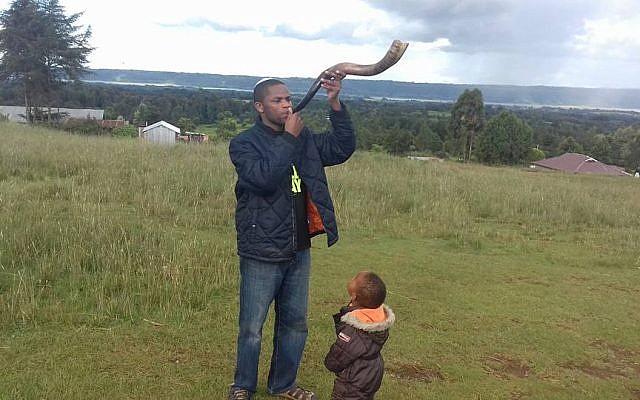A Jewish leader from Kenya who was denied entry and deported from Israel despite having a valid visa will be able to enter Israel at a later date, after a stormy Knesset committee meeting challenged the Interior Ministry’s handling of his case.
The Conservative Movement, which initiated the session along with MK Yael Cohen-Paran (Zionist Union), claimed that the Population, Immigration, and Border Authority denied entry to Yehudah Kimani as part of a pattern of discrimination toward Jews from isolated and emerging communities around the world who are not associated with the Orthodox movement.
“This is a scandal and a new height of discrimination,” Yizhar Hess, the CEO of the Conservative (Masorti) Movement in Israel, said in a statement. “I do not believe that the Interior Ministry would have behaved this way toward Jews with any other skin color or who underwent an Orthodox conversion.”
Kimani, 31, was denied entry to Israel on December 18, despite having a valid tourist visa. He had planned to study at the Conservative Yeshiva in Jerusalem for the short winter session, but was turned back entry upon arriving in Israel and immediately deported back to Kenya. He said the experience made him feel “less than human.”
Kimani addressed the Knesset Committee for Immigration, Absorption, and Diaspora Affairs meeting on January 3 via a prerecorded video message detailing his two applications for a tourist visa and rejection upon landing at Ben Gurion Airport.
At the hearing, the Interior Ministry was forced to backpedal on its decision to deny Kimani’s entry on December 18. Immediately after Kimani was deported, the ministry had claimed he had “fraudulently obtained a visa” by not informing the embassy that his first application for a visa had been denied. However, both Kimani and members of the Conservative Movement in Israel had been in direct contact with the Israeli embassy in Nairobi to understand what was missing in order to approve the second visa.
But in the session on Wednesday, the Interior Ministry claimed that Kimani had asked for a tourist visa even though the purpose of his visit was study, which requires a separate visa, although many visitors to Israel for short study programs come on tourist visas.
As a result of the session, the committee instructed the Interior Ministry to grant Kimani a visa at a future date so he can study at the Conservative Yeshiva. It is not clear if it will be a student or tourist visa. Justin Philips, who sits on the board of the Conservative Movement’s Fuchsberg Center and paid for Kimani’s travel costs, said he is considering court action to recoup the cost of the aborted trip, and will cover Kimani’s future travel.
Kimani is a leader of Kehilat Kasuku, a small group of families in Kenya’s rural highlands who decided to leave Messianic Judaism in the early 2000s.
Some members of the Kenyan community, including Kimani, have undergone Conservative Jewish conversions in Uganda with the Abayudaya community. They celebrate Shabbat and the Jewish holidays in a small, plastic-sheeting-covered synagogue with worn wooden benches. Over the past few years since The Times of Israel first visited in early 2015, Kimani has utilized Facebook to build relationships with Jews around the world. Meanwhile, the community has grown from approximately 50 members to more than 130.
Social media networking brought Kimani on a months-long fundraising trip to the United States in the summer of 2016 with Kulanu, including a stint studying at the Brandeis Collegiate Institute. The money he raised was used to build a library and pay the school fees for all 32 school-age children in the community.
Kimani, who studied tourism and hopes to run a kosher safari company in Kenya in the future, is now overseeing the final stages of building the community’s library. While waiting to see when he can return to Israel for a study program at the Conservative Yeshiva, he is also planning another trip to the US to bring awareness about his community and raise money to build a synagogue.
Kimani said that while he was initially devastated about being denied entry to Israel, he is starting to see some good in the situation.
“When I heard that my case is being discussed in Knesset, it really showed me that I have something important to do in this world,” he said from his home in Kenya. “Now people know that there are Jews everywhere, there are Jews in Kenya. They are giving me a chance to be known and the community in Kenya a chance to be known.”
Still, Kimani noted that the attention paid to his case brought negative consequences as well , including doubts as to his Jewish identity.
Amos Arbel, the director of the ministry’s Population Registry and Status Department, called Kimani “a goy [gentile] from Kenya” and asked if Israel wanted “half of Africa to come to Israel.” Arbel stressed that the Interior Ministry did not recognize Kimani’s conversion, despite the fact that the Jewish Agency recognizes the Abayudaya of Uganda as Jewish who can immigrate to Israel under the Law of Return.
“When they were discussing the visa and that case, I didn’t expect to hear that someone can say I’m a ‘goy,’” said Kimani. He and most of his family converted in Uganda in 2010 under Rabbi Gershom Sizomu and other visiting Conservative rabbis, who occasionally have held special rabbinical courts for conversions in Uganda.
Kimani is helping new members of the Kenyan Jewish community community prepare for the next rabbinical court in Uganda by connecting them online with volunteer rabbis who help them study and answer their questions. For some members, it is their first time using a computer regularly.
“I was only going to go to Israel to get knowledge and skills, to learn more to come back and teach my community,” said Kimani. “The [Israeli government] should consider opening doors for Jews of all movements.”


























